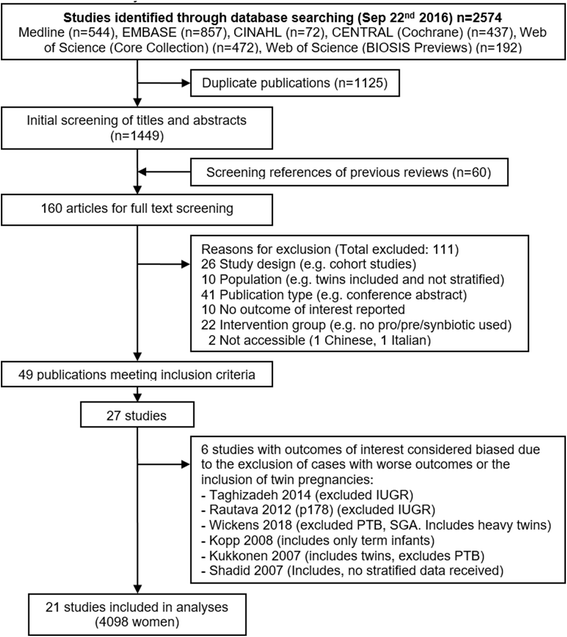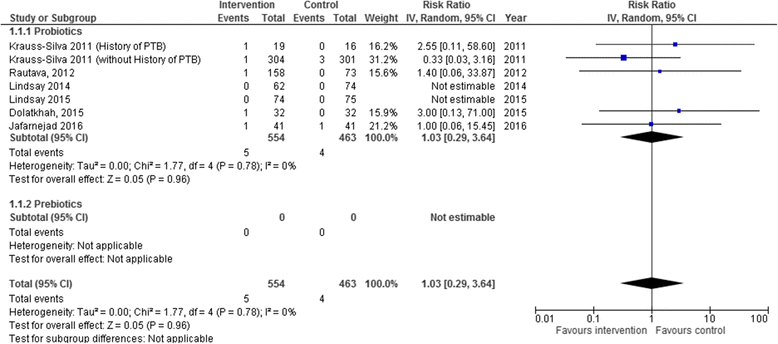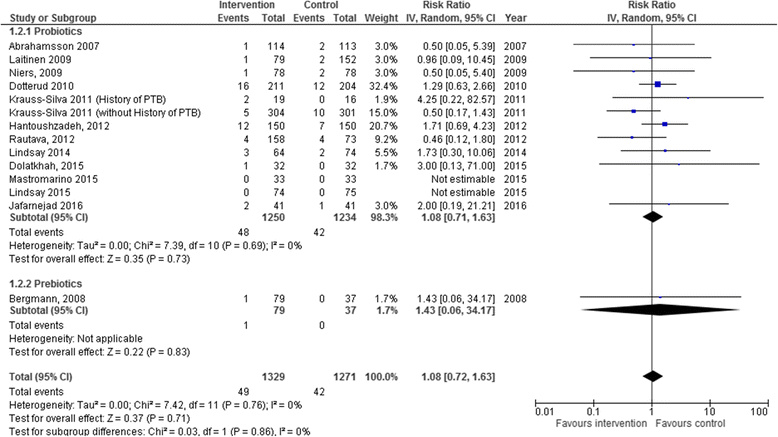Pregnancy outcomes in women taking probiotics or prebiotics: a systematic review and meta-analysis
- PMID: 29310610
- PMCID: PMC5759212
- DOI: 10.1186/s12884-017-1629-5
Pregnancy outcomes in women taking probiotics or prebiotics: a systematic review and meta-analysis
Abstract
Background: Probiotics are living microorganisms that, when administered in adequate amounts, confer a health benefit. It has been speculated that probiotics might help prevent preterm birth, but in two previous systematic reviews possible major increases in this risk have been suggested. Our objective was to perform a systematic review and meta-analysis of the risk of preterm birth and other adverse pregnancy outcomes in pregnant women taking probiotics, prebiotics or synbiotics.
Methods: We searched six electronic databases (MEDLINE, EMBASE, CINAHL, Cochrane Central Register of Controlled Trials, Web of Science's Core collection and BIOSIS Preview) up to September 2016 and contacted authors for additional data. We included randomized controlled trials in which women with a singleton pregnancy received a probiotic, prebiotic or synbiotic intervention. Two independent reviewers extracted data using a piloted form and assessed the risk of bias using the Cochrane risk of bias tool. We used random-effects meta-analyses to pool the results.
Results: We identified 2574 publications, screened 1449 non-duplicate titles and abstracts and read 160 full text articles. The 49 publications that met our inclusion criteria represented 27 studies. No study used synbiotics, one used prebiotics and the rest used probiotics. Being randomized to take probiotics during pregnancy neither increased nor decreased the risk of preterm birth < 34 weeks (RR 1.03, 95% CI 0.29-3.64, I2 0%, 1017 women in 5 studies), preterm birth < 37 weeks (RR 1.08, 95% CI 0.71-1.63, I2 0%, 2484 women in 11 studies), or most of our secondary outcomes, including gestational diabetes mellitus.
Conclusions: We found no evidence that taking probiotics or prebiotics during pregnancy either increases or decreases the risk of preterm birth or other infant and maternal adverse pregnancy outcomes.
Trial registration: We prospectively published the protocol for this study in the PROSPERO database ( CRD42016048129 ).
Keywords: Prebiotics; Pregnancy; Preterm birth; Probiotics; Synbiotics.
Conflict of interest statement
Ethics approval and consent to participate
Not applicable.
Consent for publication
Not applicable
Competing interests
AJ, AMLM, JCS, JB and SDM declare that they have no competing interests.
PM has received research support from Takeda Pharmaceuticals and Allergan PLC. He has been on the advisory board and given lectures for Allergan and has been on the advisory board for Shire Pharmaceuticals.
SMC received a grant in aid from Nestlé Research Centre for a preclinical study of probiotic bacteria in a model of irritable bowel syndrome.
None of the sponsors had any involvement in study design; collection analysis, and interpretation of data; writing of the report or decision to submit the report for publication.
Publisher’s Note
Springer Nature remains neutral with regard to jurisdictional claims in published maps and institutional affiliations.
Figures



References
-
- Grand View Research. Probiotics Market Analysis By Application (Probiotic Foods & Beverages (Dairy Products, Non-Dairy Products, Cereals, Baked Food, Fermented Meat Products, Dry Food), Probiotic Dietary Supplements (Food Supplements, Nutritional Supplements, Specialty Nutrients, Infant Formula), Animal Feed Probiotics), By End-Use (Human Probiotics, Animal Probiotics) And Segment Forecast To 2024. [http://www.grandviewresearch.com/industry-analysis/probiotics-market]. Accessed 22 Feb 2017.
-
- Ford AC, Quigley EM, Lacy BE, Lembo AJ, Saito YA, Schiller LR, et al. Efficacy of prebiotics, probiotics, and synbiotics in irritable bowel syndrome and chronic idiopathic constipation: systematic review and meta-analysis. Am J Gastroenterol. 2014;109:1547–1561. doi: 10.1038/ajg.2014.202. - DOI - PubMed
Publication types
MeSH terms
Substances
Grants and funding
LinkOut - more resources
Full Text Sources
Other Literature Sources
Miscellaneous

